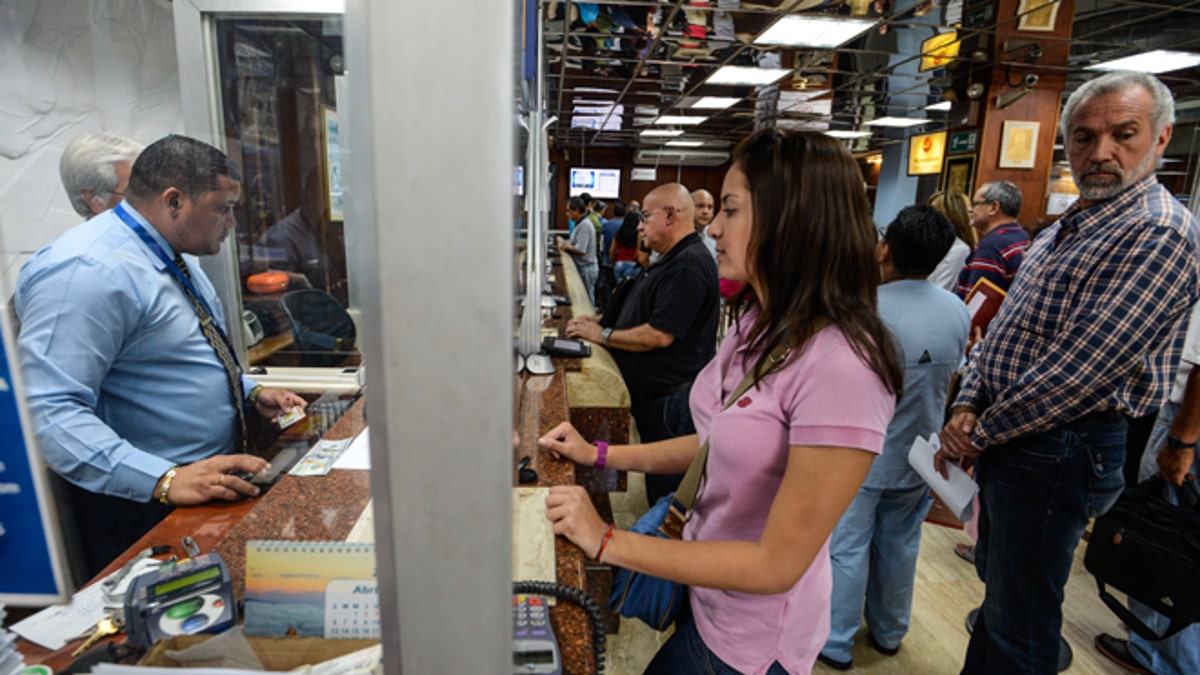
People queue at a currency exchange office in Caracas on February 19, 2015. The Venezuelan bolivar opened Thursday at 172 to the dollar on the first day of a government sponsored exchange meant to compete with the black market. The opening rate was 27 times the official rates of 6.3 to the dollar, available only for priority imports like food and medicine. The leftist government of President Nicolas Maduro earlier this month partially liberalized the country's system of strict currency controls by allowing banks and brokerage houses to sell dollars at what the market will bear. AFP PHOTO / FEDERICO PARRA (Photo credit should read FEDERICO PARRA/AFP/Getty Images)
Never mind the plummeting price of crude oil or the antiquated state-run economy or international isolation or the arcane monetary policy pursued by Venezuela’s socialist leadership. The government of Nicolás Maduro blames the runaway inflation and plunging value of the country’s currency on … a website.
The site in question, DolarToday, is a currency exchange page that dares to publish the black market rate at which Venezuelan bolívars get traded for U.S. dollars in neighboring Colombia.
The Central Bank of Venezuela has filed a lawsuit in Delaware, where the site is incorporated, alleging that the “economic terrorists” who run the website are faking exchange rate data in order to destabilize Venezuela’s economy.
“Defendants are deliberately misrepresenting and effectively manufacturing a market — a phony, distorted market for the exchange of bolivares into dollars and vice-versa, with the aim of lining their pockets with ill-gotten gains,” the suit states, according to the Miami Herald.
On Friday, a U.S. District Court judge, Gregory M. Sleet, dismissed the suit on the basis that "price inflation in a nation's economy is not an injury sufficiently particularized to the central bank."
- Venezuela’s Chavistas vow to continue fighting
- Venezuela’s socialist system faces electoral test as voters hit the polls
- Venezuela´s government launches Ministry of Urban Farming
- Venezuela’s opposition celebrates landslide win in historic election
- Best pix of the week
- Venezuela to print – much – larger denomination bills as inflation soars past 180%
- Ronda Rousey kicks butt, in and out of the ring
He did, however, give Venezuela’s bank a week to file an amended claim.
"At the core of this lawsuit is the right of this company, DolarToday, to exercise its constitutional rights of free speech and freedom of the press without being intimidated and harassed by the revolutionary government of Venezuela," Ricardo A. Gonzalez, a Miami defense attorney with Greenberg Traurig, which is representing DolarToday, told the Daily Business Review.
The company is "fighting the good fight against what is clearly repressive policies of a regime that wants to stifle civil liberties," Gonzalez added.
Venezuela’s attorney, Adam Fox, the managing partner of Squire Patton Boggs in Los Angeles, told the Herald that the defendants “have wreaked massive harm on Venezuelans in general and the Central Bank specifically with the misleading and fraudulent manner [they] have represented the exchange rate.”
The newspaper also spoke to one of the founders of the site, who asked to remain anonymous for fear the government would take reprisals on family members still in Venezuela. The site was launched in 2010 by Venezuelan expatriates in Colombia.
“The Venezuelan government knows that we haven’t done anything wrong,” he told the Herald. “They’re hoping that through a lawsuit, and the process of discovery, that they can identify our collaborators and shutdown our operations in Venezuela.”
The value of bolivares is a complicated matter. The official exchange rate is 6.3 bolívars to the dollar for essential goods like food and medicine, but other products can be imported at rates that are closer to 13 bolívars to the dollar.
There is an “official” black market-like called the Marginal Foreign Exchange System, or Simadi in its Spanish acronym, which the Venezuelan government started last fall to try to diminish the actual black market.
That rate is 200 bolivars to the dollar.
On Monday morning, DolarToday was reporting a black market rate of 1,093.10 bolívars to the dollar.








































